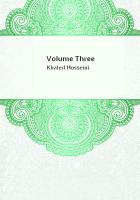Indissolubly connected with the desirability of a Censorship of Science, is the need for Religious Censorship. For in this, assuredly not the least important department of the nation's life, we are witnessing week by week and year by year, what in the light of the security guaranteed by the Censorship of Drama, we are justified in terming an alarming spectacle. Thousands of men are licensed to proclaim from their pulpits, Sunday after Sunday, their individual beliefs, quite regardless of the settled convictions of the masses of their congregations. It is true, indeed, that the vast majority of sermons (like the vast majority of plays) are, and will always be, harmonious with the feelings--of the average citizen; for neither priest nor playwright have customarily any such peculiar gift of spiritual daring as might render them unsafe mentors of their fellows; and there is not wanting the deterrent of common-sense to keep them in bounds. Yet it can hardly be denied that there spring up at times men--like John Wesley or General Booth--of such incurable temperament as to be capable of abusing their freedom by the promulgation of doctrine or procedure, divergent from the current traditions of religion. Nor must it be forgotten that sermons, like plays, are addressed to a mixed audience of families, and that the spiritual teachings of a lifetime may be destroyed by ten minutes of uncensored pronouncement from a pulpit, the while parents are sitting, not, as in a theatre vested with the right of protest, but dumb and excoriated to the soul, watching their children, perhaps of tender age, eagerly drinking in words at variance with that which they themselves have been at such pains to instil.
If a set of Censors--for it would, as in the case of Literature, indubitably require more than one (perhaps one hundred and eighty, but, for reasons already given, there should be no difficulty whatever in procuring them) endowed with the swift powers conferred by freedom from the dull tedium of responsibility, and not remarkable for religious temperament, were appointed, to whom all sermons and public addresses on religious subjects must be submitted before delivery, and whose duty after perusal should be to excise all portions not conformable to their private ideas of what was at the moment suitable to the Public's ears, we should be far on the road toward that proper preservation of the status quo so desirable if the faiths and ethical standards of the less exuberantly spiritual masses are to be maintained in their full bloom. As things now stand, the nation has absolutely nothing to safeguard it against religious progress.
We have seen, then, that Censorship is at least as necessary over Literature, Art, Science, and Religion as it is over our Drama,. We have now to call attention to the crowning need--the want of a Censorship in Politics.
If Censorship be based on justice, if it be proved to serve the Public and to be successful in its lonely vigil over Drama, it should, and logically must be, extended to all parallel cases; it cannot, it dare not, stop short at--Politics. For, precisely in this supreme branch of the public life are we most menaced by the rule and license of the leading spirit. To appreciate this fact, we need only examine the Constitution of the House of Commons. Six hundred and seventy persons chosen from a population numbering four and forty millions, must necessarily, whatever their individual defects, be citizens of more than average enterprise, resource, and resolution.
They are elected for a period that may last five years. Many of them are ambitious; some uncompromising; not a few enthusiastically eager to do something for their country; filled with designs and aspirations for national or social betterment, with which the masses, sunk in the immediate pursuits of life, can in the nature of things have little sympathy. And yet we find these men licensed to pour forth at pleasure, before mixed audiences, checked only by Common Law and Common Sense political utterances which may have the gravest, the most terrific consequences; utterances which may at any moment let loose revolution, or plunge the country into war; which often, as a fact, excite an utter detestation, terror, and mistrust; or shock the most sacred domestic and proprietary convictions in the breasts of vast majorities of their fellow-countrymen! And we incur this appalling risk for the want of a single, or at the most, a handful of Censors, invested with a simple but limitless discretion to excise or to suppress entirely such political utterances as may seem to their private judgments calculated to cause pain or moral disturbance in the average man. The masses, it is true, have their protection and remedy against injudicious or inflammatory politicians in the Law and the so-called democratic process of election; but we have seen that theatre audiences have also the protection of the Law, and the remedy of boycott, and that in their case, this protection and this remedy are not deemed enough. What, then, shall we say of the case of Politics, where the dangers attending inflammatory or subversive utterance are greater a million fold, and the remedy a thousand times less expeditious?
Our Legislators have laid down Censorship as the basic principle of Justice underlying the civic rights of dramatists. Then, let "Censorship for all" be their motto, and this country no longer be ridden and destroyed by free Institutions! Let them not only establish forthwith Censorships of Literature, Art, Science, and Religion, but also place themselves beneath the regimen with which they have calmly fettered Dramatic Authors. They cannot deem it becoming to their regard for justice, to their honour; to their sense of humour, to recoil from a restriction which, in a parallel case they have imposed on others. It is an old and homely saying that good officers never place their men in positions they would not themselves be willing to fill. And we are not entitled to believe that our Legislators, having set Dramatic Authors where they have been set, will--now that their duty is made plain--for a moment hesitate to step down and stand alongside.
But if by any chance they should recoil, and thus make answer: "We are ready at all times to submit to the Law and the People's will, and to bow to their demands, but we cannot and must not be asked to place our calling, our duty, and our honour beneath the irresponsible rule of an arbitrary autocrat, however sympathetic with the generality he may chance to be!" Then, we would ask: "Sirs, did you ever hear of that great saying: 'Do unto others as ye would they should do unto you!'" For it is but fair presumption that the Dramatists, whom our Legislators have placed in bondage to a despot, are, no less than those Legislators, proud of their calling, conscious of their duty, and jealous of their honour.
1909.















